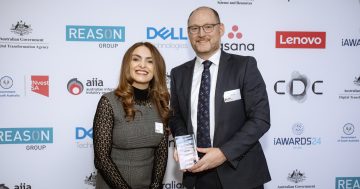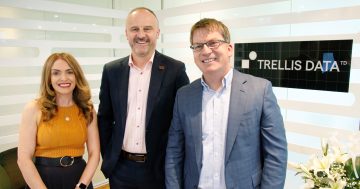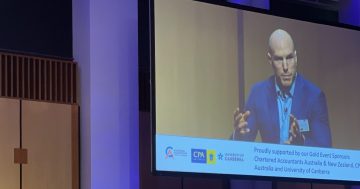
Trellis Data executives James Meszes and James Simonian talk with Toby Halligan, Media Adviser for Assistant Minister for Competition, Charities and Treasury Andrew Leigh at the tech show at Parliament House. The company is one of many Canberra success stories. Photo: Tim McLaren.
Canberra has been identified as being home to one of four digital technology superclusters in Australia, highlighting the importance of the sector to the ACT economy.
CSIRO and the Tech Council of Australia have for the first time mapped and analysed where the nation’s tech sector is operating.
Their report explores how the geographical concentration of innovation – like Silicon Valley in California – can boost growth and productivity.
Its release coincided with a tech showcase at Parliament House featuring more than 30 innovative organisations displaying cutting-edge technologies that are shaping the future.
The report found 96 digital clusters across Australia, located in every state and territory.
It said clusters were engines of growth, accounting for 63 per cent of all tech job creation in Australia, even though they cover only 4 per cent of Australia’s geographic area.
The report identified three types of clusters – superclusters, which are mega groupings of multiple clusters in the same city; city clusters; and regional clusters, including one in Queanbeyan.
The ‘Canberra Triangle’ is one of the four superclusters, spanning from Belconnen in the north-west, Phillip in the south-west, Canberra Airport in the east and Civic near the centre.
The other three are the Sydney Arc, the Melbourne Diamond and the Brisbane Corridor.
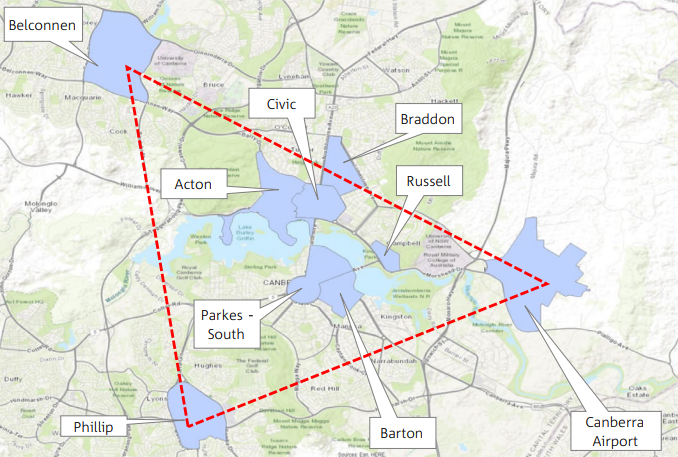
The Canberra Triangle contains two ASX-listed tech companies worth $60.14 million. Image: CSIRO and Tech Council of Australia.
The Canberra Triangle supports almost 20,000 workers representing 3.3 per cent of the national digital workforce, and contains the headquarters of two digital technology companies listed on the ASX with a combined market capitalisation of $60.14 million as of January 2023.
Tech Council of Australia CEO Kate Pounder said many people would be surprised at the extent of the technology sector in Canberra and its importance to the local economy.
“We’ve grown this whole other segment of private sector part of our economy and tech is a really big part of that story,” she said.
“So much so that 15 per cent of the workforce work in tech jobs, double [the rate] of NSW.”
Ms Pounder said the government and its needs, combined with a great concentration of universities, research institutes and CSIRO, had created the perfect environment for the tech sector to thrive.
“It’s a combination of those things that is putting Canberra on the map, quite literally,” she said.
One of the firms on show at Parliament House was home-grown artificial intelligence and machine learning company Trellis Data, founded by Rachel and Michael Gately.
It has grown from a startup to an almost 30-strong workforce and has recently opened an office in Arlington, Virginia.
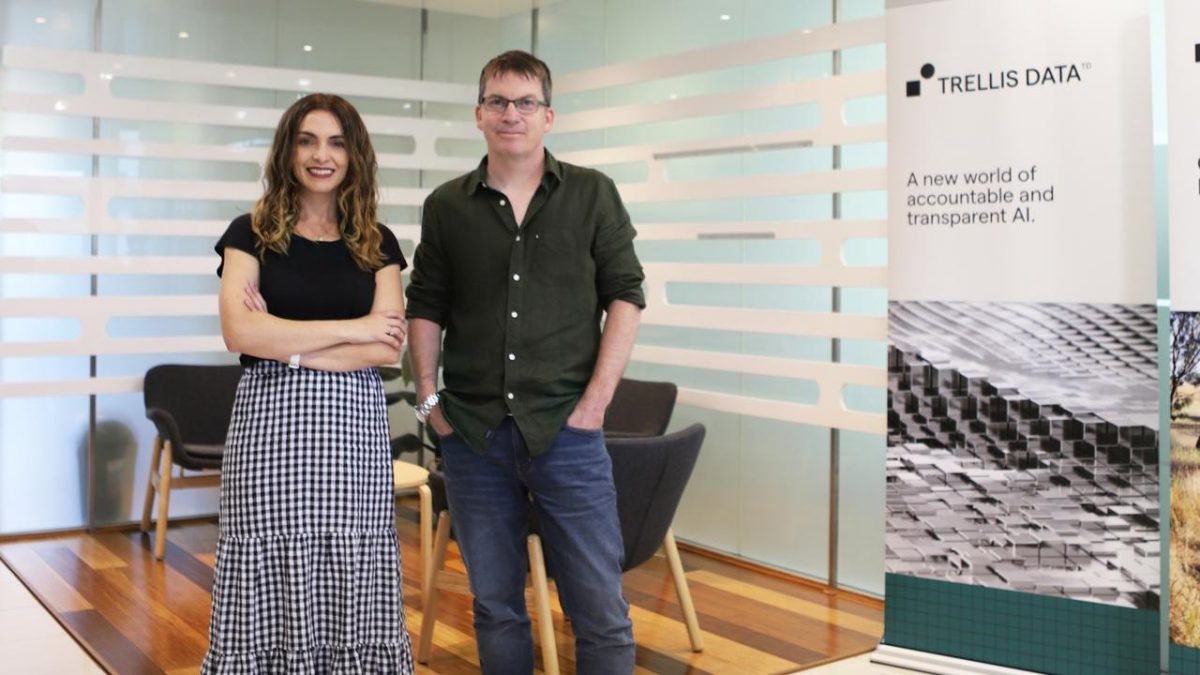
Home-grown: Trellis Data founders Rachel and Michael Gately. Photo: Trellis Data.
Head of Communications Tim McLaren said the company now had clients in Europe and Southeast Asia, as well as Australia.
“We’re looking for further investment in the near future, and we’re ready to look deploy all sorts of solutions to governments and in the private sector, across logistics, defence and law enforcement,” he said.
Mr McLaren said the company had prospered with the support of Canberra’s universities and the tech ecosystem that has evolved in the ACT, as well as the territory being a great place to live and raise a family.
“We find a lot of our staff don’t have the desire to leave Canberra and they recognise that it’s a great place to live, and they’ve got access to amazing institutions here that are at the cutting edge of AI and machine learning,” he said.
“And so it’s a fairly seamless transition to go from their degree to one of the top 20 AI companies in the country locally in Canberra, and we find there’s a very significant pool of talent coming out of the universities to draw from.”
Mr McLaren said that with so many other tech businesses in Canberra, there were also opportunities for collaboration, particularly when dealing with the “big beast” that is government.
“Sometimes you need to bring together various parts to create a whole and most of the IT companies in Canberra have got a specialty,” he said.
“When you bring them together in close proximity, you can collaborate and fill different pieces of the jigsaw puzzle and put a more comprehensive offer to government or whoever it might be.”
Ms Pounder said many innovative companies were being spun out of the research sector including a lot of Australia’s top quantum firms such as Quintessence Labs, biotech companies like Nourish Ingredients, and analytics companies such as Liquid Instruments, as well as software firms.
The tech sector was a mix of home-grown entrepreneurs and those from interstate and overseas who discover the national capital’s advantages.
Ms Pounder said the founders of semiconductor and 3D printing business Syenta were an ANU professor, Luke Connal, and a post-doctoral student from Eastern Europe, Jekaterina Viktorova, who made Canberra her home because she thought it was a great place to set up a company.
But she said a constant challenge for the ACT was its tight labour market and skills shortages, as well as retaining businesses as they grew.
Ms Pounder said the ACT needed to be more strategic, and she welcomed Senator David Pocock’s call for a city partnership deal with the federal government with innovation as a key pillar.
She said the recently announced National Capital Investment Framework should also include innovation.
The government could assist by providing more linked-up infrastructure corridors and facilities for dedicated tech accelerators.
Ms Pounder also called for the Canberra Innovation Network to be turbocharged so it could accommodate the growing number of companies in the sector and pilot programs for commercialisation of ideas.
“It’d be amazing to keep more of these companies here,” she said.













